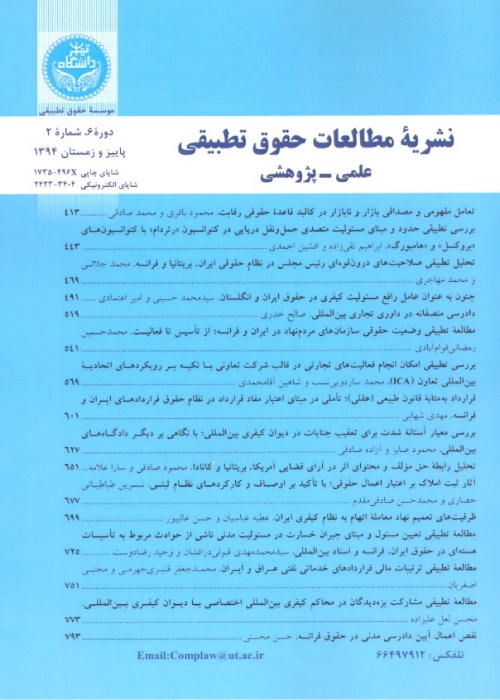Re-thinking of the Validity Conditions and Consequences of Reservation in the Bill of Lading
Evidential value of bill of lading concerning the cargo specification is confirmed by all international conventions. This function works unless the carrier insert reservation in the bill of lading. The validity of reserve is an issue which is less addressed by Iranian doctrines, as one may infer from reservation non-liability clause which itself is declared to be null and void by the international conventions. So, does the validity of reserve depends on agreement by the consignor? Or shall it be reasoned in a way that the grounds for the reserve shall also be inserted in the bill of lading in order to be effective? On the other hand, the carrier might refuse to insert reserve in the bill of lading either personally or per request of the consignor and receiving a letter of indemnity from the latter. Is carrier liable vis-à-vis the consignee for ignoring the reserve and concealing the truth and shall the letter of indemnity be considered as valid and effective? The legitimacy and validity of conditions of reserve on one hand, and the effects of reservation on the other hand are among the issues which are analyzed in this article in view of comparative study of English and French legal systems and international transport conventions. It is concluded that the carrier’s reserve in the bill of lading is a unilateral act which does not require the consent of the consignor except under CMR Convention under which the effectiveness of reserve is dependent on the consignor only vis-à-vis the latter and not towards the third parties, i.e. the BL holders. However, the reserve shall be justified in order to be valid and the cause of reservation shall be specified together with the reserve as well, under the later international regulations (Hamburg Rules). In terms of consequences of reservation, it is worth noting that by reservation the burden of proof shall lie upon the BL holder while without it the carrier himself should have proved that the damage had been incurred before his taking delivery of the cargo. Also, the agreement not to insert reserve in the BL is effective between the carrier and the consignor unless they have an intent to defraud the third parties. However, the above agreement or the Letter of Indemnity in substitution of reservation could not be adduced by its parties against the third parties.
- حق عضویت دریافتی صرف حمایت از نشریات عضو و نگهداری، تکمیل و توسعه مگیران میشود.
- پرداخت حق اشتراک و دانلود مقالات اجازه بازنشر آن در سایر رسانههای چاپی و دیجیتال را به کاربر نمیدهد.


